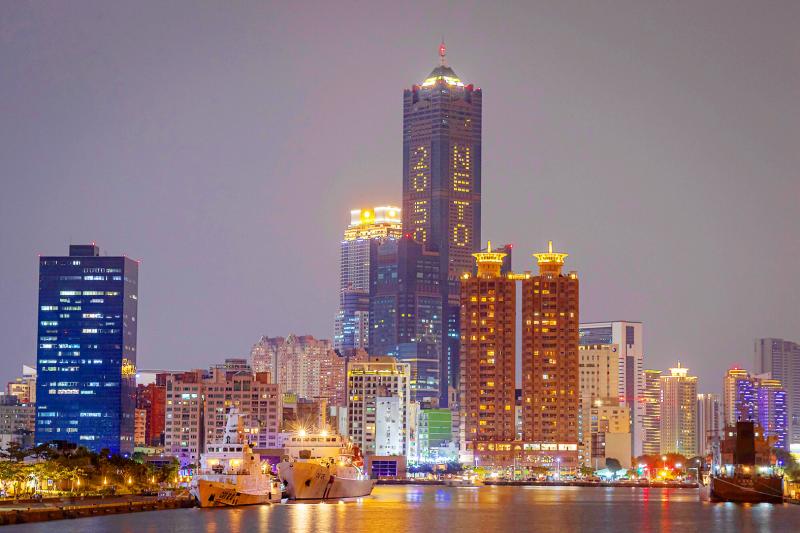President Tsai Ing-wen (蔡英文) yesterday reaffirmed Taiwan’s commitment to net-zero emissions by 2050 at a “Taiwan Day” event held on the sidelines of the UN’s COP26 climate summit to highlight the nation’s resolve to join the climate fight as a global partner.
COP26 is being held in Glasgow, Scotland, until Friday without Taiwan’s formal participation.
Instead, a delegation of more than 30 Taiwanese officials arrived on Friday to stage activities and attend events on the sidelines of the summit as a “non-governmental organization.”

Photo courtesy of Greenpeace East Asia
Its plans culminated yesterday in “Taiwan Day,” an event held to communicate the nation’s resolve to participate in global climate response, as well as to echo Tsai’s call for net-zero emissions by 2050, Representative to the UK Kelly Hsieh (謝武樵) said.
Addressing the event via a video message, Tsai spoke of Taiwan’s willingness to work with its global partners, saying no country can solve the climate crisis alone.
“Since 2016, our government has been actively pursuing energy transition and developing a more aggressive plan to accelerate toward net neutrality,” she said.
To demonstrate this commitment, net-zero emissions by 2050 would be written into law, Tsai said, referring to Premier Su Tseng-chang’s (蘇貞昌) instruction to the Environmental Protection Administration on Aug. 30 to include the goal in its draft climate change response act.
She highlighted Taiwan’s achievements, including its 450 percent increase in solar power capacity over the past five years and the creation in 2019 of the nation’s first offshore wind farm.
“Our efforts do not end here,” she added.
Taiwan also plans to become a center of green energy in Asia “with the hopes of sharing our experiences and working together with our neighbors for the sustainable development of the region,” Tsai said.
“I would like to take this opportunity to reiterate Taiwan’s willingness and ability to work side-by-side with global partners to achieve our shared goal of net-zero emissions by 2050,” she added.
In Taiwan last night, climate advocacy groups celebrated by illuminating the sides of Taipei 101, the Presidential Office Building and Kaohsiung’s 85 Sky Tower with climate-forward messages.
Plan B, 350 Taiwan, the Taiwan Youth Climate Coalition and Greenpeace in a news release expressed their hope that the messages reading “TW,” “net 0” and “2050” would spark public discussion of climate issues.

A magnitude 7.0 earthquake struck off Yilan at 11:05pm yesterday, the Central Weather Administration (CWA) said. The epicenter was located at sea, about 32.3km east of Yilan County Hall, at a depth of 72.8km, CWA data showed There were no immediate reports of damage. The intensity of the quake, which gauges the actual effect of a seismic event, measured 4 in Yilan County area on Taiwan’s seven-tier intensity scale, the data showed. It measured 4 in other parts of eastern, northern and central Taiwan as well as Tainan, and 3 in Kaohsiung and Pingtung County, and 2 in Lienchiang and Penghu counties and 1

FOREIGN INTERFERENCE: Beijing would likely intensify public opinion warfare in next year’s local elections to prevent Lai from getting re-elected, the ‘Yomiuri Shimbun’ said Internal documents from a Chinese artificial intelligence (AI) company indicated that China has been using the technology to intervene in foreign elections, including propaganda targeting Taiwan’s local elections next year and presidential elections in 2028, a Japanese newspaper reported yesterday. The Institute of National Security of Vanderbilt University obtained nearly 400 pages of documents from GoLaxy, a company with ties to the Chinese government, and found evidence that it had apparently deployed sophisticated, AI-driven propaganda campaigns in Hong Kong and Taiwan to shape public opinion, the Yomiuri Shimbun reported. GoLaxy provides insights, situation analysis and public opinion-shaping technology by conducting network surveillance

‘POLITICAL GAME’: DPP lawmakers said the motion would not meet the legislative threshold needed, and accused the KMT and the TPP of trivializing the Constitution The Legislative Yuan yesterday approved a motion to initiate impeachment proceedings against President William Lai (賴清德), saying he had undermined Taiwan’s constitutional order and democracy. The motion was approved 61-50 by lawmakers from the main opposition Chinese Nationalist Party (KMT) and the smaller Taiwan People’s Party (TPP), who together hold a legislative majority. Under the motion, a roll call vote for impeachment would be held on May 19 next year, after various hearings are held and Lai is given the chance to defend himself. The move came after Lai on Monday last week did not promulgate an amendment passed by the legislature that

AFTERMATH: The Taipei City Government said it received 39 minor incident reports including gas leaks, water leaks and outages, and a damaged traffic signal A magnitude 7.0 earthquake struck off Taiwan’s northeastern coast late on Saturday, producing only two major aftershocks as of yesterday noon, the Central Weather Administration (CWA) said. The limited aftershocks contrast with last year’s major earthquake in Hualien County, as Saturday’s earthquake occurred at a greater depth in a subduction zone. Saturday’s earthquake struck at 11:05pm, with its hypocenter about 32.3km east of Yilan County Hall, at a depth of 72.8km. Shaking was felt in 17 administrative regions north of Tainan and in eastern Taiwan, reaching intensity level 4 on Taiwan’s seven-tier seismic scale, the CWA said. In Hualien, the